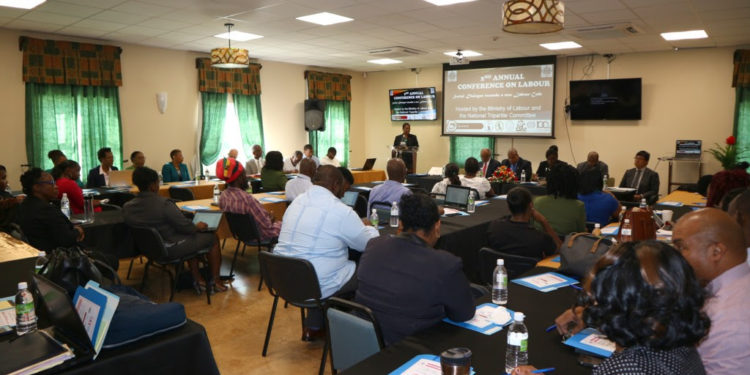The main focus of the meeting was reflected in the theme, “Social Dialogue Towards a New Labour Code.” As such, the 85 participants in attendance, representing the public and private sectors as well as employee organizations, reviewed the draft labour code that was compiled by consultant Sir Clare Roberts of Antigua and Barbuda.
The suggestions made at the conference will be included, where possible, into the draft document. The final draft is expected to go to Cabinet for approval and then to the Parliament for debate in the first quarter of 2019.
Social dialogue is defined by the International Labour Organization (ILO) to include all types of negotiation, consultation or simply exchange of information between, or among, representatives of governments, employers and workers, on issues of common interest relating to economic and social policy.
The ILO notes that the main goal of social dialogue itself is to promote consensus building and democratic involvement among the main stakeholders in the world of work.
Permanent Secretary, Ron Dublin-Collins said that social dialogue remains at the core of the Ministry of Labour’s activities to improve industrial relations in St. Kitts and Nevis.
“We at the ministry are committed to the belief that social dialogue plays a key role in creating decent jobs, and improves performance for business. Thus, through enhanced social partnerships and by raising awareness at all levels of issues such as our labour code, we will undoubtedly realize better organized and a more efficient labour environment,” he stated at the opening ceremony.
The permanent secretary added that the main facilitator of enhanced social dialogue is the National Tripartite Committee, which was established in September 2017. The 12-member committee is made up of representatives from the government, St. Kitts and Nevis Chamber of Industry and Commerce, and the St. Kitts and Nevis Trades and Labour Union. The body meets regularly and advises government on employment and labour issues including labour laws and international labour standards.
Sir Clare and the National Tripartite Committee were commended for their contributions in producing a proposed labour code. During the process of drafting the proposed labour code, 15 pieces of existing legislation with the associated Statutory Rules and Orders were reviewed. These include the Recruitment of Workers Act, Accident and Occupational Diseases Act, Apprenticeship and Tradespersons Qualification Act, Labour (Minimum Wage) Act, Protection of Employment Act, Trade Unions Act, Equal Pay Act, and the Government Auxiliary Employees Act, among others. The revision and consolidation of these laws will conform to international standards.
“The road to labour reform is never smooth. For every step forward, we will have challenges. We will need to see the bigger picture and not be blindsided by past successes or by differences, past or present, but we shall remain true to our conviction that genuine and meaningful tripartite social dialogue is the best route to social justice. Social dialogue, therefore, is increasingly called upon to anticipate and manage the changes in the work environment,” said Mr. Dublin-Collins.









